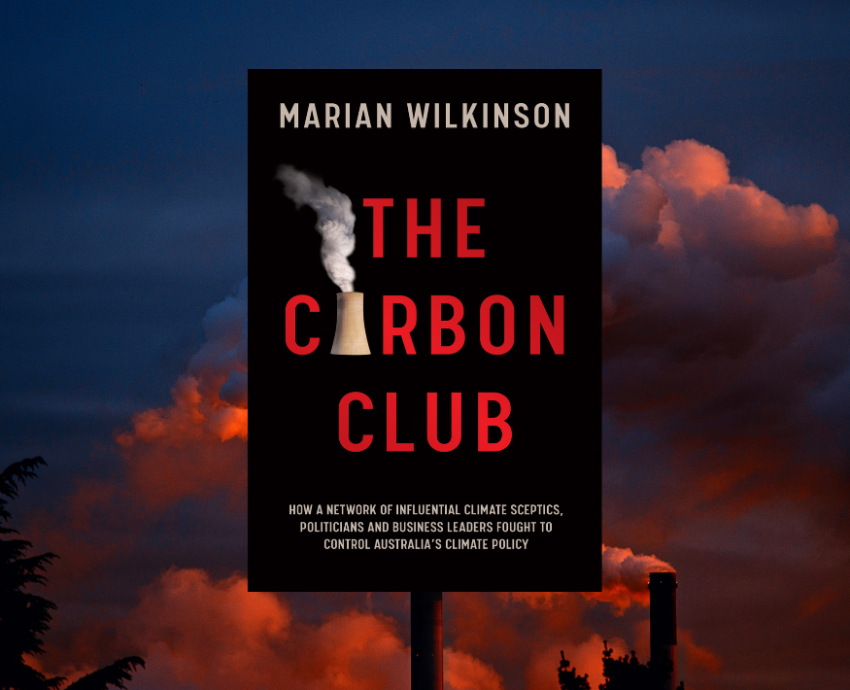
The Carbon Club: How a network of sceptics, politicians and business leaders fought to control Australia’s climate policy.
By Marian Wilkinson
Allen and Unwin, Sydney. 2020.
425pp.
In August 1997, Malcolm Wallup, head of the United States climate sceptic group Frontiers of Freedom and former Republican senator was about to address climate sceptic conference Countdown to Kyoto in Canberra, when Greenpeace activists disrupted his speech in an early protest against the climate sceptic movement.
In The Carbon Club, Walkley Award-winning journalist and co-author of Dark Victory Marian Wilkinson documents the rise of the US-influenced network of corporate executives, climate sceptics and right-wing politicians who have waged a more than 20-year-long campaign to undermine climate action by the Australian government.
In the late 1990s/early 2000s, climate sceptic groups such as the Competitive Enterprise Institute, the Cooler Heads Coalition, former ExxonMobil head Lee Raymond and former Liberal politician Nick Minchin were at the forefront of undermining government commitment to climate action.
under John Howard, the Australian government, along with the George W Bush administration in the US, helped to undermine the Kyoto Protocol when they withdrew from it in 2001. When the Australian Labor Party under Kevin Rudd was elected in 2007, among the first things the new government did was to re-sign the Kyoto Protocol.
However, beyond this symbolic action, the Rudd and then Julia Gillard Labor governments’ actions on dealing with climate change were underwhelming, agreeing to a mere 5% decrease in emissions at the 2010 Kyoto negotiations between 2013 and 2020. Even these inadequate actions met significant resistance from the US-linked climate sceptic movement, from 2008 onwards.
Then-opposition leader Tony Abbott’s parliamentary secretary Cori Bernardi enlisted the help of Tim Andrew, a libertarian who did an internship with the renowned reactionary Koch Brothers in the US, to set up an “astro-turfed” campaign against the Gillard government’s proposed carbon tax, by creating the “people’s revolt” against the climate policy, using the power of social media and the tactics of the US Tea Party movement.
By exploiting anger and disaffection among voters towards politicians, the climate sceptic movement was able to bring together 20 different organisations, including the National Civic Council, the Christian Democrats, the Young Liberals, the Liberal Students’ Federation, shooters, farmers, the Lavoisier Group, the Libertarian Party of Australia and various climate-sceptic groups to create a broad anti-carbon tax campaign in 2010-11.
Ultimately, this so-called “people’s campaign” fractured conservative politics and undermined the ability of either major party to act effectively to deal with climate change, especially after the election of Abbott as prime minister in 2013.
Despite numerous changes of Coalition prime ministers since 2013, Australia’s lack of climate action continues, with a right-wing dominated government committed to maintaining the corporate profits of Australia’s fossil fuel industries (when he was treasurer, Scott Morrison even brought a lump of coal to the parliament as a prop).
This inaction has come at a heavy cost, with Australia being hit by extreme bushfires, droughts and floods, culminating in the Black Summer bushfires of 2019-20. Carbon Club is a damning account of the key forces that got us to this point.
Since the onset of COVID-19, the demand for energy declined, leading to the largest-ever fall in global emissions. However, scientists have pointed out that this would have to be repeated every year till 2030 to keep the global temperature rise to well below 2°C.
Wilkinson writes that since the 2019-20 bushfires and the COVID-19 pandemic, the carbon club is starting to break up. However, the Morrison government is committed to a gas-led recovery from the pandemic.
Wilkinson stresses that Australia’s political leaders need to deal with the climate crisis over the next two decades. However, this relies upon the major parties acting in the interests of people instead of fossil-fuel industries, carrying out measures that the science demands, instead of the inadequate targets set by the Coalition and the ALP.
To do this, the climate movement will have to campaign to pressure the government to enact real climate action, and ultimately take on and defeat the power of the capitalist class that enabled the climate sceptic movement to take hold.